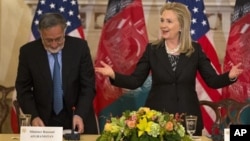On May first of this year, President Barack Obama and President Hamid Karzai signed the Enduring Strategic Partnership Agreement between the Islamic Republic of Afghanistan and the United States of America. This agreement will help to guide the two countries’ relationship once U.S. combat troops complete their withdrawal from Afghanistan by the end of 2014.
The document broadly defines the major areas of agreement and mutual interests between the United States and Afghanistan. It also ensures that both sides are effectively carrying out their commitments to each other. That’s why the document establishes the United States-Afghanistan Bilateral Commission, which will be entrusted with hammering out the individual points and precise details of the Strategic Partnership Agreement.
In early October, U.S. Secretary of State Hillary Clinton and Afghan Foreign Minister Zalmai Rassoul launched the Bilateral Commission, and announced the lead negotiators for a Bilateral Security Agreement that will supersede the current Status of Forces Agreement.
“For more than a decade, Americans and Afghans have worked side-by-side to help the Afghan people build a more stable and secure future. We have also fought side-by-side to improve security throughout the country, to strengthen Afghanistan’s democratic institutions, to support its civil society, and to sow the seeds of economic opportunity for the Afghan people,” said Secretary Clinton at the Commission launching ceremony.
“The Strategic Partnership Agreement and this bilateral commission will help to guide the relationship between Afghanistan and the United States as we move to the next phase of our relationship. It reflects a shared vision and a shared commitment to mutual responsibility and accountability. And it focuses on areas that will be critical to Afghanistan’s future, including in the areas of security, human rights and democracy, institutions and governance, economic development, and regional security and cooperation,” she said.
As Afghan Foreign Minister Rassoul said that day: “Ten years ago we had just begun emerging from a long, dark era of war, violence, and destruction. The challenges of restoring security to the lives of the Afghan people and rebuilding Afghanistan into a stable and democratic country seemed overwhelming. Today, nevertheless, we are a proud member of the community of nations and moving steadily toward a peaceful and self-reliant future. Our partnership has responded to the threats to international peace and security and has placed Afghanistan on the path towards a secure, democratic and prosperous future.”
The document broadly defines the major areas of agreement and mutual interests between the United States and Afghanistan. It also ensures that both sides are effectively carrying out their commitments to each other. That’s why the document establishes the United States-Afghanistan Bilateral Commission, which will be entrusted with hammering out the individual points and precise details of the Strategic Partnership Agreement.
In early October, U.S. Secretary of State Hillary Clinton and Afghan Foreign Minister Zalmai Rassoul launched the Bilateral Commission, and announced the lead negotiators for a Bilateral Security Agreement that will supersede the current Status of Forces Agreement.
“For more than a decade, Americans and Afghans have worked side-by-side to help the Afghan people build a more stable and secure future. We have also fought side-by-side to improve security throughout the country, to strengthen Afghanistan’s democratic institutions, to support its civil society, and to sow the seeds of economic opportunity for the Afghan people,” said Secretary Clinton at the Commission launching ceremony.
“The Strategic Partnership Agreement and this bilateral commission will help to guide the relationship between Afghanistan and the United States as we move to the next phase of our relationship. It reflects a shared vision and a shared commitment to mutual responsibility and accountability. And it focuses on areas that will be critical to Afghanistan’s future, including in the areas of security, human rights and democracy, institutions and governance, economic development, and regional security and cooperation,” she said.
As Afghan Foreign Minister Rassoul said that day: “Ten years ago we had just begun emerging from a long, dark era of war, violence, and destruction. The challenges of restoring security to the lives of the Afghan people and rebuilding Afghanistan into a stable and democratic country seemed overwhelming. Today, nevertheless, we are a proud member of the community of nations and moving steadily toward a peaceful and self-reliant future. Our partnership has responded to the threats to international peace and security and has placed Afghanistan on the path towards a secure, democratic and prosperous future.”




